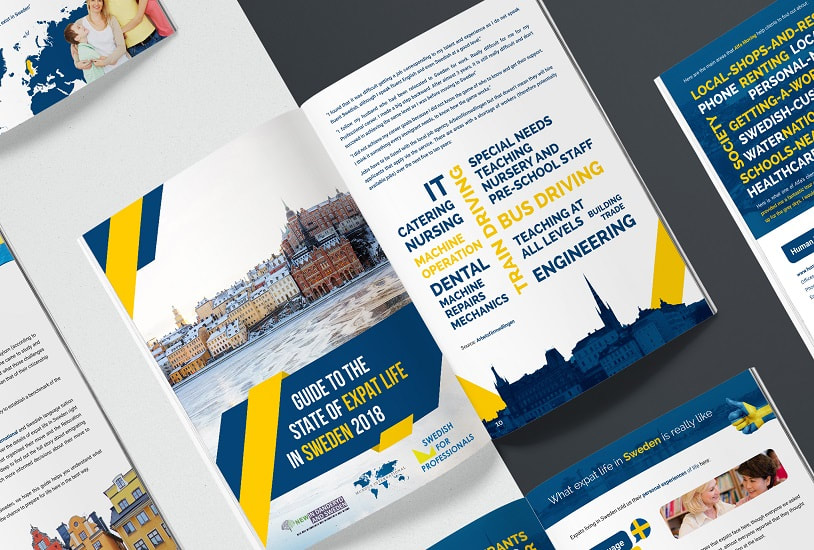Though language learning is mentioned, many expats told us that they perceived they were excluded from job opportunities not for lack of language ability because they were foreign – on the surface, clear discrimination – but when we dug down deep, we could see another cause, one you can read about in our guide to the State of Expat Life in Sweden 2018! “Sometimes all the planning in the world won't prepare you for it, but as long as you know where your nearest coffee house is everything falls into place!”
We at New in Sweden (NiDS) worked with news and analysis provider Mundus International and Swedish language tuition provider Swedish for Professionals to uncover the details of expat life in Sweden. We have quizzed expats that are here, the HR staff that organised their move and the Relocation Agents that supported them during the process. We dug deep to find out the full story about emigrating here and hope that new arrivals can then make much more informed decisions about their move to Sweden. Our guide to the state of expat life in Sweden is out now. It covers the main challenges expats are experiencing right now and the reasons for them, the support that is and isn’t provided at a personal level and what help is out there. We have a separate report that looks at what expats told us in comparison with other surveys, the political environment and what needs to change for expat life to improve. Get your copies of both here.
0 Comments
Are you planning to move to Sweden or are already an expat in Sweden? Would you like to find exactly what a ‘personnummer’ is, what the numbers mean, how to get one and how to use it? Read on to find out! What is a ‘personnummer’? Personnummer – or a personal identification number (also known as a 'personal number'). Everyone registered in Sweden is identified with a personal identification number. It consists of 10 digits and it is unique to each individual. It is primarily used by Swedish authorities and organisations to identify people. When did Sweden introduce the ‘personnummer’? This system, which was the first in the world to include a nation’s entire population, was introduced in 1947 and has been used ever since, with minor improvements throughout the years. What do the numbers indicate? The personal number consists of the person's birth date and three birth numbers. The only information that can be gathered from looking at a personal identification number is a person’s birth date and their gender. The birth date consists of six digits and makes up the first part of the personal identification number. The order of the numbers is: birth year, birth month and birth day (YYMMDD).For example, a person whose first 6 digits in the personal identification number is 640823 was born on 23rd August 1964. A person whose first 6 digits in the personal identification number is 930411 was born on 11th April 1993. The birth number consists of three numbers. The second to last digit provides information concerning the gender of the person - where the digit is odd for men and even for women. The birth date and birth number are connected with a hyphen (-). This sign is replaced by a plus sign (+) the year a person turns 100 years old!
The last digit of the personal number is a control digit. It is calculated mechanically by the birth date and birth number. How do you obtain a ‘personnummer’? If you are planning to move to Sweden or are already living in Sweden and are planning to live here for a year or more, then you should in most cases be registered as a resident in Sweden. To be registered in Sweden simply visit the Swedish Tax Agency (Skatteverket) and apply. Make sure your spouse, children or anyone else that is also applying to be registered in Sweden are also there! You will need the following documents when you visit the Swedish Tax Agency
Once you are registered in Sweden:
When do I use my ‘personnummer’? Swede’s use their personal identification number on a daily basis! Life in Sweden is made easier by being able to do a variety of things by having a personal identification number. The biggest advantage is that it is a unique identity for each person – this prevents confusion of data about people as well as ensures certain safety and protection of personal integrity. A personal identification number also ensures that each individual gets what they are entitled to, such as pension and housing allowances as well as ensuring that each individual is charged the correct tax. Some examples of when you can use your personal identification number:
And many more! Join New in Sweden to find out more about personal numbers, get help applying and settle in fast to life here. |
Subscribe to the blog here:
About the blog
Interesting bits and pieces about life in Sweden, including all-important song words. Categories
All
Archives
January 2021
|



 RSS Feed
RSS Feed
